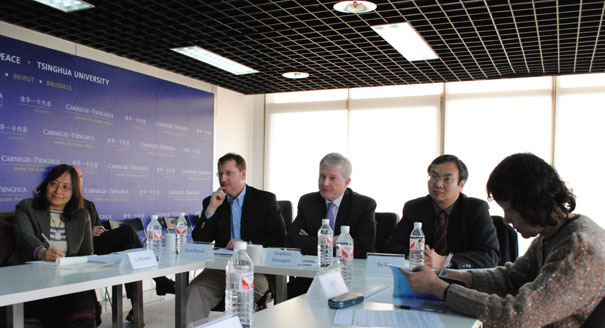Registration
You will receive an email confirming your registration.
As the world’s focus shifts towards East Asia, multilateral institutions like NATO are seeking to increase their involvement and cooperation with China. Limited past interaction between China and NATO has led to an uncertainty in China about NATOs intended role in the Asia-Pacific and the nature of its cooperation with China. However, both sides now recognize the need for closer military and political ties to address issues of regional and global instability. The Carnegie-Tsinghua Center for Global Policy held a video conference between Chinese scholars and NATO officials to discuss areas of strategic interest to NATO and China and ways that both sides can find common ground.
Stephen Flanagan, the Kissinger Chair in Diplomacy and National Security at the Center for Strategic and International Studies, gave the keynote remarks. The panel of Chinese scholars providing commentary included Carnegie-Tsinghua’s Chen Qi, China Foreign Affairs University’s Su Hao, Gao Hua of the Chinese Academy of Social Sciences, Li Weiwei of the Chinese Institute for International Studies, and Carnegie-Tsinghua’s Shi Zhiqin. Carnegie-Tsinghua’s Paul Haenle moderated.
Clarifying Perceptions: NATO’s Involvement in Asia
As NATO seeks to deepen alliances with Asia and specifically engage China, Flanagan explained that the key challenge was developing mutual trust.
- Lack of a Formal Asia Policy: NATO officials stressed that the organization had no formal Asia policy. While NATO does have regional partners, an NATO official stated that the organization does not have a clear role in the region. He added that NATO does not want to present itself as intruding in Asia and has no formal views on the ongoing territorial disputes or China’s cross-strait relations.
- Questions About NATO’s Interest in Asia: Flanagan stated that until recently, there was only limited dialogue between NATO and China. Several of the Chinese scholars responded that Beijing has understandably questioned NATO’s sudden interest in the region. One scholar explained that NATO’s intentions in Asia are unclear since the purpose of NATO was to serve as a security alliance to face a common enemy.
- A New NATO: Su explained that Beijing viewed NATO as a U.S.-affiliated military organization with security functions. He added that NATO’s post-Cold War policy shifted toward managing military and political forces. In response, Flanagan cited former U.S. secretary of state Steve Campbell’s statement on NATO evolving into a humanitarian relief agent. Campbell had also stated that there was no expectation from the United States for NATO to engage with China or other East Asian powers.
Common Security Concern: Afghanistan
Both China and NATO share a common interest in maintaining stability in Afghanistan and investing further in the country’s natural resources, participants agreed. The withdrawal of U.S. forces gives China and NATO an opportunity to collaborate and fill the security vacuum.
- China’s Current Involvement: Wei explained that Afghanistan is an important strategic area because of its abundance of energy resources. The Chinese have invested heavily in obtaining these resources. Wei added that Beijing does recognize that China has benefitted from U.S. security initiatives in Afghanistan. He added, though, that China has helped train some 300 security forces to date.
- NATO’s Position on Afghanistan: Several NATO officials stated that NATO would not abandon efforts in Afghanistan following the U.S. withdrawal. However, they explained that NATO had no concrete plans to follow up the withdrawal. Flanagan echoed this, stating that NATO has plans to reduce its presence in the country over time. NATO officials explained Afghanistan needed to be embedded in the Asian economic structure, not the Western one. As a result, they stated that NATO saw China’s involvement in Afghanistan has crucial.
The Future of NATO-China Relations
The expansion of NATO into East Asia relies on the cultivation of a strong, transparent relationship with China, discussants stated. They agreed that transforming current relations of misunderstanding and mistrust to mutual trust and benefit requires cooperation.
- From Mistrust to Mutual Trust: Flanagan explained that Beijing has expressed potential interest in the prospect of a closer relationship with NATO. This relationship would need to be based on the principles of mutual trust, mutual benefit, equity, and cooperation. Wei added that trust can be built if NATO gives China more details—the more information, the more trust can be built, he asserted. Mutual trust, Su added, will help China overcome its disapproval of NATO’s past military affiliations and pave the way for future cooperation on security issues in the Indian Ocean and Middle East.
- Further NATO-China Engagement: Another NATO official expressed NATO’s desire to establish more military to military contact and people to people exchanges. Both sides, she added, needed to reciprocate a willingness to engage. Examples of such exchanges, the official noted, included inviting Chinese officials to NATO defense colleges and vice versa. Another NATO official added the idea of further formal video conferences with Chinese experts. Gao added that dialogue on the areas of cybersecurity, piracy, Afghanistan, and energy cooperation were especially needed.
